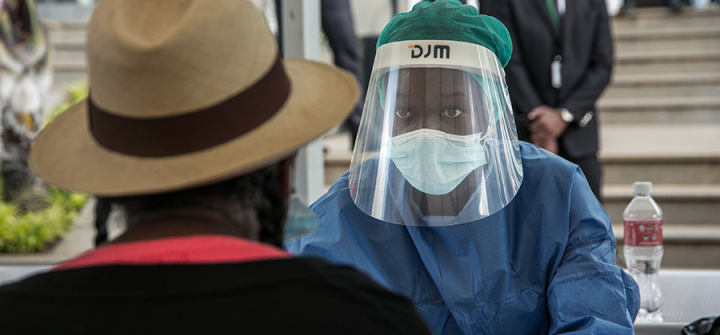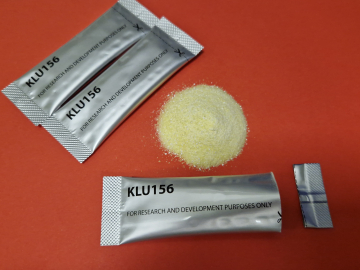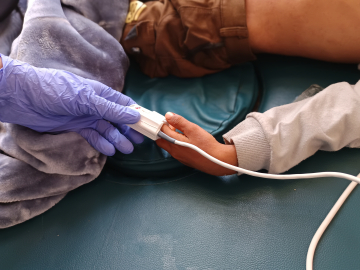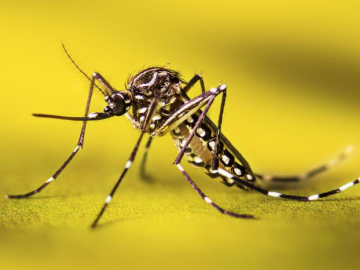In COVID-19, the Africa CDC Faces Its Greatest Challenge
As the novel coronavirus marched through Asia, Europe, and North America earlier this year, Africa had a brief chance to prepare. Then, in typical COVID-19 fashion, a small number of imported cases set a blaze that has reached 49 countries.
Africa reported more than 3,600 cases and 87 deaths on March 31, according to WHO Africa. That’s a fraction of the number of confirmed cases in New York, but the potential for a much greater viral disaster in Africa is considerable.
Africa used its advance warning as well as possible, says John Nkengasong, PhD, director of the Africa Centres for Disease Control. Just 3 years old, Nkengasong’s organization quickly convened health ministers on February 22 to agree on a continental strategy. It’s also led the expansion of testing capacity: In January, no labs were able to process SARS-CoV-2 tests, but now 48 countries can. The CDC has also organized “train the trainer” events in infection prevention and control, surveillance, airport screening, risk communication, and care and management of cases, he said.
Blessed with a young population (60% to 70% of Africans are under 30, says Nkengasong) and challenged by fragile health systems and endemic diseases, Africa has an uncertain future with COVID-19—especially as cases begin to increase sharply.
“I think our situation is getting complicated,” says Nkengason, a virologist who worked for more than 2 decades in the US CDC, in an exclusive interview with GHN. “We are in the morning of the outbreak at the moment. China is in the sunset.”
What are you most worried about over the next several months?
I'm very worried about the virus seeding itself into vulnerable communities, like in the slums of most capital cities. That would be a big challenge. Or in refugee camps—there are quite a good number across the continent. That would be a big challenge.
Are there any strategies for what to do if it gets into a densely populated slum?
I don't think we need to wait until we get there. We just need to make sure that we engage those communities, the leadership structure in those communities, as early as possible to establish trust, and make sure that the messages we are putting in that community are really being used properly before it actually hits. We hope it doesn't, but if it does, we rely so much on community engagement and community leadership in those settings to fight the virus.
You’ve been able to train a lot of people, but what about the availability of test kits? How is that proceeding?
Yeah, it's a challenge. We have done our best. We have rolled out more than 75,000 tests across the continent. WHO has also rolled out so many tests. The partnership between the Jack Ma Foundation and the prime minister of Ethiopia provided each of the 55 member states with 20,000 tests. That amounted to 1.1 million tests. [But] the swabs are in short supply. The reagents are in short supply.
Is there a solution for that?
In the coming weeks, we should be receiving a large amount of some of these supplies from China. But that's the only place we can think of now because Europe is in short supply, the US is in short supply. So that's the big challenge in the response.
Are you competing with developed countries to buy these?
Sure, sure. And personal protective equipment, like masks and others, are in short supply across the world. That's the most unfortunate situation with this pandemic: It's affecting every part of the world. It used to be that when we have an Ebola outbreak here in Africa, we count on Europe or the US to import supplies. But everybody is affected at the same time, and it becomes a big, big challenge. We begin to see where we are extremely vulnerable because we don't manufacture enough on the continent.
Ventilators are already in short supply in the US, and they will be in short supply in Africa as well.
Absolutely. If we have a short supply in the US and Europe, you can imagine how chronic it is here. That is one of my greatest worries and fears is that we will not be able to meet up with the need for that.
Are there any options at all when it gets to that stage?
The only option we have is to continue to work with global solidarity. We will, in the coming weeks, be heading in the direction of China to get a lot of these things. We hope we can get as many as possible. We also hope that we can get some from Europe. We are actively in the engaged in the process of getting some for our continent, as much as we can.
What are your expectations for the virus' interactions with HIV, TB, malaria? Will they automatically lead to worse outcomes?
We just don't know. If we are hit hard, the way we are already seeing in some countries like South Africa and others, of course, it disrupts your HIV, TB, and malaria programs. And so that is one thing at a programmatic level, at a macro level. At a micro level, you just don't know what interactions would be between this virus and HIV or TB and malaria in terms of co-infections.
Are you seeing a lot of misinformation out there, and what's the best way to combat that?
There's certainly a lot of misinformation, ranging from not believing that this is real, to other information related to the use of chloroquine and other ways of either preventing or curing [the disease]. We are working with different groups to set up social media approaches to combat as much as possible. We are putting out statements to clarify the use of existing drugs like chloroquine to say that, "Look, we need to do clinical trials to understand this better. You cannot rely on a [small] number of patients that have been treated using this drug and make an extrapolation."
COVID-19 is a huge challenge for a fairly new organization like yours.
Yeah, we were born on the 31st of January, 2017. To be thrown in the middle of this—we think that member states are very appreciative. It's a good sign for the aspiration for the continent to show leadership and find solutions for its own problems.
Ed. Note: This interview has been edited for length and clarity.
View GHN’s latest coronavirus news.
For the latest, most reliable COVID-19 insights from some of the world’s most respected global health experts, see Global Health NOW’s COVID-19 Expert Reality Check.
Join the tens of thousands of subscribers who rely on Global Health NOW summaries and exclusive articles for the latest public health news. Sign up for our free weekday newsletter, and please share the link with friends and colleagues: https://www.globalhealthnow.org/subscribe
A health care worker tests for COVID-19 yesterday in Antananarivo, Madagascar. Photo by RIJASOLO/AFP via Getty Images





